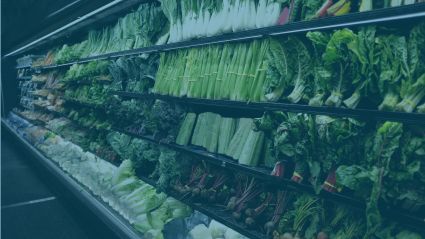
Some of America’s biggest health problems are actually food problems.
More than one in 10 people in the United States don’t have reliable access to nutritious food, and over 100 million suffer from diet-related disease. Today, 85 percent of US health-care costs come from treating chronic diet-related illnesses, and nearly half of deaths caused by heart disease, stroke, and type 2 diabetes are related to poor diet.
These trends are sobering—but reversible.
As a leading grocery technology company, Instacart has a unique opportunity—and responsibility—to help people live healthier lives. This is the motivation for Instacart Health, a new initiative featuring product innovations, partnerships, research, and policy advocacy around three themes: nutrition security, healthy made easy, and food as medicine.
Together, we can ensure everyone has access to the nutritious food they need to live healthier lives.
Practitioners, researchers, and policymakers have rightly moved beyond focusing solely on food security to also focus on nutrition security—that is, access to healthy food. A common barrier to nutrition security is affordability, and we’re helping address that. Since 2020, we have helped more than 70 retailers spanning over 8,000 stores bring Supplemental Nutrition Assistance Program (SNAP) online in 49 states and the District of Columbia. Our next step is adding Temporary Assistance for Needy Families (TANF)—cash assistance for families with low incomes—as a payment method on our platform with the goal of expanding SNAP and TANF to all Instacart grocery partners by 2030. This means more families will have an easier time using these benefits to buy healthy food and everyday essentials.
We also want to make it easier for people to make informed decisions and find healthy inspiration that meets their needs, tastes, and budgets. With our focus on healthy made easy, we’re introducing new tools and features that give consumers greater access to nutrition information.
Meanwhile, we’re ramping up our work to support food as medicine programs—such as medically tailored grocery programs and nutrition incentive initiatives—which allow doctors and dieticians to help guide patients’ diets. These programs have proven effective at disease prevention, management, and treatment: Studies have shown a connection between medically tailored meals and decreased hospital admissions and health expenditures. Nutrition incentives can also positively impact health outcomes including glycemic control, HIV, and hypertension.
One of the challenges with food as medicine is scale. Dietitians can be difficult to access or afford, and in rare cases when physicians offer food recommendations to patients, those patients are usually responsible for acquiring the food themselves. So how do we help more people access the benefits of food as medicine programs?
This is where technology can play an important role.
We’re helping scale food as medicine programs and giving health-care providers and patients new tools to promote better health. We now offer a Fresh Funds tool that lets any entity—nonprofits, employers, health systems—fund grocery stipends that can be used for specific categories, such as fresh or frozen produce. We also launched a new technology, Care Carts, that allows health-care providers and caregivers to order and send groceries and medical supplies on behalf of someone else—say, a patient or a loved one. And we’ve introduced new tools that let dieticians and nutritionists share shoppable lists and recipes with their patients.
But introducing new technologies alone is not enough. We’re working with policy leaders to help shape public policies that support nutrition incentives and medically-tailored meals as part of the health-care system and to increase funding for research to better understand the impact of those programs on health and wellness. We’ll also leverage our scale, our data insights, and our research partnerships to study the impacts of bringing food as medicine initiatives online. While ensuring we protect customer privacy, this research can help inform future public- and private-sector solutions.
This combination of innovation, research, and advocacy—and the feedback cycle they create—is vital. At Instacart, our conversations with our partners and engagement with public officials inform our technology solutions. At the same time, our product work and customer feedback inform our discussions with partners and policy leaders. It’s that feedback, ideation, and iteration loop that can drive real and lasting solutions in this space.
This is just the beginning, and we’re excited about the road ahead. We believe food and nutrition, combined with technology, is a key to scaling more personalized and preventative health care, and we’ll be exploring new solutions in the months and years ahead. We can’t do it alone, and we’re excited to partner with diverse stakeholders in this work. Together, we can ensure everyone has access to the nutritious food they need to live healthier lives.





















